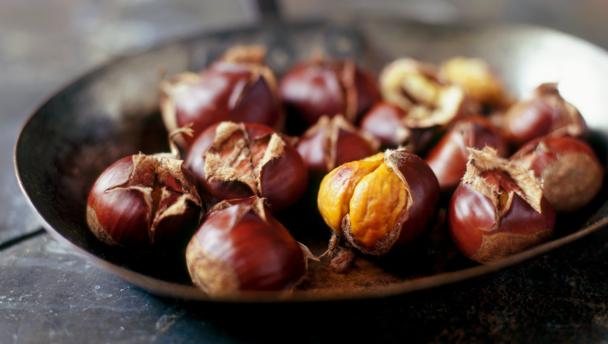Here's a list of recipes for Pesach (and all year round) that I've tried and loved:
○
Bais Yaakov Cookbook's Roasted Garlic Zucchini Soup (page 10. No soup mixes needed; use less water than called for to intensify the flavor; less onions and leeks are also fine)
○
Butternut Squash Soup (add onion if not suffering from acid reflux)
○ What's Cooking?'s Potato Kneidlach (for the fellow non-brockers)
○ Cucumber Salad/Coleslaw
○ Overtime Cook's Tri-color Pepper Salad
○ Baba Ganoush (no nutritional yeast, chili/red pepper flakes instead of sriracha)
○ What's Cooking?'s Potato Kneidlach (for the fellow non-brockers)
 |
| Via Food.com, by "Delicious as it Looks" |
○ Cucumber Salad/Coleslaw
○ Overtime Cook's Tri-color Pepper Salad
○ Baba Ganoush (no nutritional yeast, chili/red pepper flakes instead of sriracha)
○
Spaghetti Squash "Lukshen" Kugel (milchig)
○
Cauliflower Pizza Crust
○
Pragmatic Attic's Intense Fudge Nuggets: These are an absolute miracle. No oil, only two egg whites, no potato starch, and a reasonable amount of sugar. Every other recipe I could find for Pesach cookies consisted of three cups of confectionery sugar or an entire cup of oil!
Easy to make, these have a light, almost meringue-y consistency, yet are soft and divinely satisfying. I have found that by turning off the oven at the 8-minute-mark and leaving them in for another few minutes, they swell in size while nurturing a gooey center. After removing from the oven, allow them to cool before storage. They are INSANE out of the freezer. I have two batches currently in mine.
Easy to make, these have a light, almost meringue-y consistency, yet are soft and divinely satisfying. I have found that by turning off the oven at the 8-minute-mark and leaving them in for another few minutes, they swell in size while nurturing a gooey center. After removing from the oven, allow them to cool before storage. They are INSANE out of the freezer. I have two batches currently in mine.
○
Chestnut-Date Balls
The below are recipes I would like to try, but have not yet:
○ Rita Nakouzi's Shredded Green Cabbage Salad with Lemon and Garlic: My palate is full-on Hungarian, which means that cabbage ranks rather high. In a holiday of too much fats, I like a coleslaw option that's less mayo and more garlic.
○ Mazel Munch's Pesach Shepherd's Pie: I would use safflower oil instead of margarine, personally, but all of my food fantasies come back to shepherd's pie, perhaps simply because I just love love love potatoes.
○ Tamar Ansch's Salisbury Steaks in Mushroom Sauce: I love ground meat, I love mushrooms, I love sauce.
○ Vichna Belsky's Chocolate Quinoa Cake or Cupcakes: This is a variation of a popular online gluten-free yet still nutritious dessert. Pragmatic Attic uses coffee instead of the dairy-free milk, which means I don't have to purchase kosher l'Pesach almond milk, which I otherwise don't need. I am psyched about it because it is filling, unlike most non-gebrocks desserts. It can also be made into a two-tier cake with frosting of choice.
 |
| My results of Pragmatic Attic's Intense Fudge Nuggets |
The below are recipes I would like to try, but have not yet:
○ Rita Nakouzi's Shredded Green Cabbage Salad with Lemon and Garlic: My palate is full-on Hungarian, which means that cabbage ranks rather high. In a holiday of too much fats, I like a coleslaw option that's less mayo and more garlic.
○ Mazel Munch's Pesach Shepherd's Pie: I would use safflower oil instead of margarine, personally, but all of my food fantasies come back to shepherd's pie, perhaps simply because I just love love love potatoes.
○ Tamar Ansch's Salisbury Steaks in Mushroom Sauce: I love ground meat, I love mushrooms, I love sauce.
○ Vichna Belsky's Chocolate Quinoa Cake or Cupcakes: This is a variation of a popular online gluten-free yet still nutritious dessert. Pragmatic Attic uses coffee instead of the dairy-free milk, which means I don't have to purchase kosher l'Pesach almond milk, which I otherwise don't need. I am psyched about it because it is filling, unlike most non-gebrocks desserts. It can also be made into a two-tier cake with frosting of choice.
























